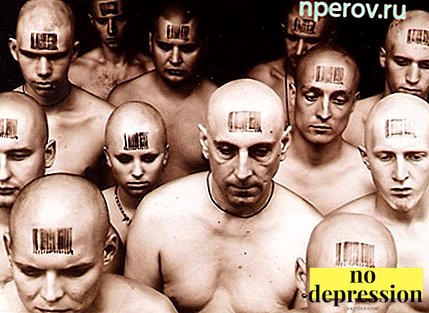The brain is a real universe within us, worthy of constant study. But you can explore yourself in different ways. Infinitely plunge into the abyss of self-consciousness or honestly talk to your “I” and begin to act. Analyze your mistakes or start all over again, but taking into account past experience. Self-knowledge or reflection helps to know oneself, but it is not capable of changing life without effort on our part. And yet: is reflection good or bad? Why do reflective people feel rather boring than successful? How to stop solving problems at the level of the mind and go to action? In life it is worth creating events so that there is something to reflect on.
What is reflection?
Reflection is a thought process directed deep into your mind in order to understand the actions, thoughts, feelings, through critical reflection and observation of their mental space. Translated from Latin, the word literally means "turning back," that is, the experience of past experience. The ability to analyze and draw conclusions from previous actions is considered one of the most important abilities of man, which distinguishes him from other living beings on earth.
Reflection is studied by different sciences and in each there is a definition of this concept with small additions:
- Elementary - the simplest analysis of their mistakes. Allows the person to draw conclusions himself so as not to step on one rake twice.
- Scientific - is the ability to criticize scientific findings, methods, techniques to get to the bottom of the truth in research.
- Philosophical - a way to turn the consciousness deep into yourself for infinite self-knowledge. It is considered an important and main feature of the character of all famous philosophers.
- Theological - reflections on the immortality of the soul outside the body through self-knowledge and the knowledge of God.
- Psychological - the ability to analyze not only their actions, but also feelings, emotions, states, experiences.
A little story about reflection
Like many scientific concepts, reflection received its first definition in ancient philosophy. Pythagoras and Heraclitus interpreted this concept as a manifestation of the higher mind, the ability of a person to ascend above the material world in order to think freely about the sublime. That is - to philosophize. Further, the concept complemented Socrates, Plato, Aristotle. It is on the reflections about continuous self-knowledge that the famous endless dialogues of ancient philosophers are built.
With the increased influence of religion on people's lives, the concept was formed theological reflection. In it, more attention was paid to faith as the only way to know oneself in inseparable connection with higher powers. The most famous works on this topic are Thomas Aquinas and His Holiness Augustine.
With the gradual differentiation of science from the church, reflection becomes a sign of a living mind, which is able to critically comprehend the early ideas about nature and criticize the most unscientific ones. The first scientific concept of reflection was introduced by Descartes, further developed by J. Locke, Leibniz, Kant, Hegel, Schopenhauer, and others. From such an abundance of famous surnames, it becomes clear that the concept of reflection is very complex and multifaceted.
how psychological definition reflexion Formulated in the early twentieth century. It concentrates on the process of self-knowledge and self-criticism. Psychologists have identified some concepts of personal reflection, which helps not to get lost in a difficult world. Personal reflection in psychology is divided into 3 types:
- Situational - This is an analysis of the situation in the present.
- Retrospective - evaluation of events that took place in the distant or recent past.
- Prospective - prediction of the future based on an analysis of previous actions.
The theme of reflection was actively investigated not only by philosophers and scientists. A profound study of their individuality was depicted on canvas by artists, described by writers and poets. The works of Shakespeare, Pushkin, Proust, Bunin, Berdyaev, Freud, Dostoevsky are devoted to the theme of knowing their individuality.
The concept of reflection in the modern interpretation
In modern everyday life, the concept of reflection is used in a different interpretation. Thanks to modern propaganda of endless achievements and active actions, self-knowledge no longer evokes reverent respect. On the contrary, it is considered a sign of inaction and laziness. If someone is called "reflective," it means that he is spoken of as a depressive person who is engaged in dull self-searching. And if the word “introvert” is added, then it is impossible to talk to such a person or to do anything. In other words - a person reflexive in the modern concept endlessly marking time, while others reach the unattainable in friendly ranks.
Extroverts and introverts reflect differently?
Our time is the time of mass worship in front of public people, extreme sports and accessible information in social networks. Our time loves and appreciates open people, so it seems that it belongs to extroverts. It is not easy for an introvert - a person with an inner look that is turned inward. But this does not mean that sociable extroverts are not prone to self-digging, and introverts are engaged exclusively in the study of the inner world. Yes, extroverts and introverts are different. They know themselves differently.
Extraverted reflection more based on knowledge of the outside world. In the process of self-knowledge, the extroverts view themselves within the concept of "world-others-me" and constantly keep connections with their surroundings. But continuous active communication sometimes does not give an opportunity to understand oneself, therefore extroverts are more often subject to fusion of personality, imitation, imitation.
Introverted reflection more aimed at self-examination of the sovereign "I". Introverts often distance themselves from the environment, focus more on their own experiences, feelings. Sometimes even too concentrated, immersed in themselves so that they create the impression of uncommunicative or even asocial individuals.
Man is part of the world with his universe inside. Therefore, it is extremely rare to find people completely open or closed to communication. So extroverted and introverted reflection is not the opposition of concepts, but two parts of a single whole "person in general", endowed with the best spiritual qualities.
2 sides of reflection in our lives
Little kids are not engaged in self-digging. They are confident and irresistible. That is why psychologists often advise to remember themselves in childhood and stop criticizing their actions, behavior, thoughts, feelings. In adolescence, life changes dramatically. Against the background of mad hormones, along with acne and figure flaws, self-doubt comes.
Someone gets a refusal of first love, someone hears criticism of parents, someone together is recorded in the "club of losers". This is where the problems begin. If a teenager does not receive help from parents or educators, he may to focus on their own shortcomings and become one of those reflective whiners, about which with such convictions write to the network.
But, as the saying goes: "only measure determines whether a substance is poison or medicine." Without a healthy self-criticism, the ability to adequately assess their actions and behavior is also not far away. So what can a properly chosen dose of reflection give us?
To understandWho am I?" at any age
Today you can read or see stories from life that are described in approximately the same way: "an adult has a good family, children, work, car, vacation at sea and at the same time feels unhappy." Why does this happen? Because a person who as a child failed to build his "I", sooner or later begins to suffer. A simple question to yourself: "who am I?" at any age causes confusion.
Self-knowledge is self + knowledge. That is your knowledge about yourself. Not invented or hung, but its internal. To get him out of the inside, psychologists recommend conducting a full revision of life:
- Remember childhood, thank parents for what they did. If you have reached a mature age, it means that your parents coped well with their role of advocates and educators.
- Separate yourself from the social role and think about your internal needs.. Self-knowledge is a constant development, therefore, it is worth developing not only in social terms, but also personally.
- Get courage to be honest with yourself. Sometimes it’s scary to shiver to admit to yourself that everything you have or do not have is the result of your action or inaction.
Dosed, but stubborn self-help will help an adult to get a clear answer to the question from himself "Who am I? ". This process is long and creative. If you treat self-knowledge responsibly, roles, masks, visibility, contrived flaws gradually disappear and I am real, with whom it is much easier to live. The person gradually ceases to seek confirmation from outside it becomes calmer and happier.
Understand the importance of the present moment.
Our brain is a sly super machine that can draw us into living our own life only through memories or expectations. That is, remembering the past or hoping for the future, we manage to ignore the greatest jewel - the present moment. Knowing about yourself is good. But the knowledge gained must be applied in practice.
And at one point it is important to stop philosophizing in order to start acting. Successful people argue that the problems of the mind cannot be solved at the level of the mind. Everything we need for a better life is already there.. It's time to apply this in action.
The most annoying thing is that we habitually postpone "for later" not only unpleasant things, but also such expected everyday joys:
- Children's hobbies (dancing, music, sports, traveling, painting).
- Shift unloved work.
- Studying of foreign language.
- A trip to the cinema, a walk in the park, a meeting with friends, a favorite cafe, an interesting book, a photo session,
It's a shame, yes? This phenomenon even had its own concept - procrastination. It is irrational, because it steals the main thing - our life. Of course, one can complain endlessly about the origin, character, "spinelessness", debts and obligations. BUT you can analyze your previous mistakes for one purpose - not to repeat them again. And yet - to develop goals and work to achieve them.
According to the principle of take-and-do-right-now, all modern psycho trainings and coaches work. Under the conditions of trainings and master-classes, conditions are artificially created in which participants finally begin to DO, rather than reflect on doing. For our money, coaches literally kick us towards our dream. They make us do what we put off for many years. And it is not surprising that a man after training runs with burning eyes, scaring everyone around. It turns out that much can be achieved with much less effort. As in the story about the peasant who asked God to win the lottery ticket, he did not buy the ticket. So, you just need to buy a lottery ticket. Do not ask for a miracle, but create it yourself.
findings
- Self-knowledge - a noble and necessary thing. The ability to analyze our emotions, feelings, actions, behavior makes us human.
- Reflection - This is the process of dosed self-knowledge. To make it useful, theoretical knowledge should be applied in practice.
- Extroverts and introverts reflect, but they do it in different ways.. Together, they represent the best concept of "man in general", able to reflect on themselves and act.
Small children and cats are self-reliant and irresistible. Psychologists advise adult people to immerse themselves for a short time in a state of complete self-confidence without self-criticism and samodes.



